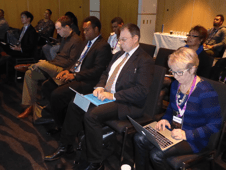PacINET 2015, the annual conference of the Pacific Islands Chapter of the Internet Society (PICISOC), was held on Day 0 of NetHui. This was scheduled in-between the two sessions of InterCommunity 2015 and brought together stakeholders from the region to discuss various issues related to Internet use in the Pacific Islands.
As part of the rich agenda, I provided an update on ISOC’s activities in the Asia-Pacific region, as well as what we have done with the Pacific Islands community thus far this year. I also stressed the need for continued collaboration between organisations working in the region as well the need for avoiding duplication of efforts and activities.
The programme included updates from various organisations working in the region, including an update on the Pacific ICT Ministerial Meeting that was held in June in Tonga where ISOC presented on Collaborative Security and also helped with sponsorship. This Ministerial Meeting was important as it identified the next phase of ICT development strategies and focus areas for the Pacific Islands.
During the Q&A session at PacINET, I also raised the point that the Pacific Islands Chapter should be a part of the CROP ICT Working Group which is charged with developing the ICT agenda for the Pacific Islands. I pointed out that in past incarnations of CROP ICT, PICISOC had been an active participant including contributing to the development of the Pacific Plan. It was encouraging to receive a commitment from USP (University of the South Pacific, who are the lead coordinating agency for CROP ICT) that PICISOC will receive a formal invitation to join the group and PICISOC Board Members will be following up on this.
The Internet Society is a founding partner of the ISIF programme that provides assistance for development related projects. Two of the past awardees from the Pacific Islands provided updates on their projects and there were also country presentations from Fiji and an update from Vanuatu on the recovery efforts after Cyclone Pam devastated the country. ISOC contributed to the relief efforts in Vanuatu by providing power generators that were used to restore communications services.
The Pacific Islands face many challenges. The great distances between countries and the dispersed population is a key issue in the provision of services, as is the relatively small market size in most economies. However, the Internet is also something that helps empower these communities and gives them an opportunity to actively participate in the global economy. This is why continued and open access to the Internet – and all the services and applications it helps enable from education to health to financial systems – is even more critical. Over the years, good progress in improving Internet access has been made in the Pacific Islands but there is still much to do.
The Internet is rapidly evolving and there is some new application or service released just about every day. More people are constantly coming online and participating in the new global Digital Economy. It is critical that the people of the Pacific also have every opportunity to participate. The Internet is for everyone, and belongs to everyone – and it can do much to alleviate the tyranny of distance and time that has for so long impacted the Pacific Islands – and its ability to be a part of this new global economy.
Doing this needs getting a few things right:
· Development of infrastructure, and having appropriate policy and regulatory measures to effect progress
· Developing communities, and empowering them in the use of ICTs and the Internet
· Building human capacity – policy, technical and operational – such that all opportunities available can be maximised
The above forms the core of the Internet Society’s Access and Development strategy, and we will explore this in greater detail in a future post.
Its been a while since I have had the opportunity to attend PacINET; it was good to be able to participate this year and meet friends old and new. There were many discussions and ideas, and we look forward to furthering the dialogue on these with our friends in the Pacific.

